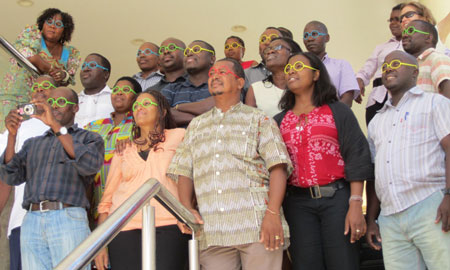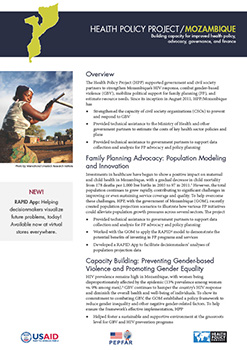The Health Policy Project ended in 2016. Work continued under Health Policy Plus (HP+) until 2022.
Mozambique

Country & Regional Programs
- ► Africa
- ► Asia and the Middle East
- ► Europe and Eurasia (E&E)
- ► Latin America and the Caribbean (LAC)
Overview
In a country with high HIV prevalence, women in Mozambique are even more likely to be affected by HIV. Recognizing that gender inequalities and gender-based violence fuel the spread of HIV, the U.S. President's Emergency Plan for AIDS Relief (PEPFAR) launched its Gender-Based Violence Initiative as part of the overall effort to prevent HIV. Mozambique is committed to reducing gender-based violence and has established a policy framework to address gender equality and gender factors related to HIV, and to prohibit acts of violence against women.
What We Do
In Mozambique, the Health Policy Project (HPP) strengthens the capacity of local, indigenous organizations to integrate gender and gender-based violence (GBV) prevention and response into existing HIV programs as a way to reduce GBV and prevent the spread of HIV—particularly among women, orphans, and vulnerable children. As a result, these organizations will help increase women’s access to crucial health services and address factors that reduce GBV.
Strengthen Local Capacity to Integrate Gender
The FHI 360 Capable Partners Program (CAP) works with more than 20 local organizations to strengthen their capacity to design, implement, manage, and monitor HIV programs and other activities. HPP is collaborating with CAP to mainstream gender into the capacity-building guidance it provides to local partner organizations.
HPP also strengthens the capacity of select CAP-supported organizations to integrate gender and GBV into their existing HIV programs and to strengthen their use of data to design, monitor, and evaluate programs. In turn, these groups are able to help ensure gender initiatives reach communities within the scope of current programs, enhancing access to HIV services and reducing GBV.
Advance the Skills of Local Gender Experts
Given the importance of cultural and political contexts pertaining to gender and HIV issues, HPP draws upon local experts who are members of gender and GBV networks and organizations as part of the technical support team. Working with individuals who are already linked with local networks will also help in recruiting other individuals who are committed to supporting gender and GBV efforts in Mozambique while strengthening the capacity of their organizations over the long term.

HPP workshop participants wearing their gender lenses—a tool from the workshop to encourage participants to view their projects, as well as their community and society in general, with an eye on gender.
Recent Progress and Achievements
- HPP conducted gender training sessions for U.S. Mission staff in Mozambique.
- In February 2012, HPP organized the first gender integration workshop for 21 individuals from seven local Mozambican partners.
Publications and Resources
Preventing Gender-based Violence: A Training Manual
Estimated Resource Needs and Impact of Mozambique’s Plano Estratégico do Sector Saúde, 2014-2019
PEPFAR Gender and HIV/AIDS Fact Sheet (PDF)
Integrating Gender and Gender-Based Violence into HIV Programs: Mozambique Workshop Report
This workshop applied five participatory and interactive modules to build the capacity of participants to use practical skills and tools to integrate GBV prevention and responses into existing HIV programs.
News
HPP Supports Gender Training in Mozambique
In August 2011, HPP helped develop and conduct a three-day training on gender issues for U.S. Government mission staff, health managers, and PEPFAR implementing partners in Mozambique.
Photos: HPP Gender Workshop in Mozambique
HPP conducted a three-day workshop on gender integration and gender-based violence in Maputo as part of the PEPFAR Gender-Based Violence Initiative in Mozambique.
Partners
HPP collaborates with a range of in-country and international partners in Mozambique, including:
- FHI 360 Capable Partners Program (CAP II)
- N’weti
- Rede Contra o Abuso de Menores (Rede CAME)
- Associação Moçambicana Mulher e Educação (AMME)
- Núcleo das Associações Femininas da Zambézia (NAFEZA)
- HACI (formerly Hope for African Children Initiative)
- Rede Moçambicana de Organizacões contra SIDA (MONASO)
- Conselho Cristão de Moçambique (CCM)
- PEPFAR Gender-Based Violence Working Group


